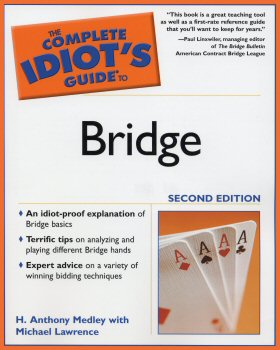| The first edition of Complete Idiot's Guide to Bridge by H. Anthony Medley was the fastest selling beginning bridge book, going through more than 10 printings. This updated Second Edition includes some modern advanced bidding systems and conventions, like Two over One, a system used by many modern tournament players, Roman Key Card Blackwood, New Minor Forcing, Reverse Drury, Forcing No Trump, and others. Also included is a detailed Guide to Bids and Responses, along with the most detailed, 12-page Glossary ever published, as well as examples to make learning the game even easier. | ||
| Dan in Real Life (6/10): by Tony Medley Dan Burns (Steve Carrell) is a high-minded advice columnist who is the widowed father of three young daughters, 8-year old Lily (Marlene Lawston), 15-year-old Cara (Brittany Robertson), and 17-year-old Jane (Alison Pitt). The two older daughters have problems with Dan. Cara has the hots for a boy she has known for three days, and Jane wants to drive. Dan dampers both of their desires, much to their dismay. He implies to Cara that she can’t be “in love” with someone she has only known three days, a reasonable position for a father to take with a 15-year-old daughter. At this point I’m thinking that this is a movie with a good premise, showing a father giving proper discipline to his children. But director, co-writer Peter Hedges has other ideas in mind. They are invited to a family get-together in Rhode Island at their parents (John Mahoney from TV’s Frasier and Dianne Wiest). His young daughters are unenthusiastic. Dan has lived a sexually cloistered life since the death of his wife. When he goes to the library after their arrival in Rhode Island, he meets a hot chick, Marie (Juliette Binoche), and falls for her. She reluctantly gives him her phone number. Returning to the family compound, he reveals to his family that he’s met someone he really likes. Before he can tell more, his brother, Mitch (Dane Cook), enters and introduces them all to his new girlfriend, who turns out to be Marie. That sets the stage for what is apparently intended as a screwball comedy, as Dan and Marie are so attracted to one another that Marie knows she is not going to continue with Mitch, whom she has only known for three weeks (sound familiar? What is young Cara thinking?). Dan, in turn, is in a quandary. He’s a high-principled advice columnist. How does he handle this situation? Here’s where Hedges sets the stage to paint Dan as a hypocrite in the eyes of Cara. How can he be in love with someone he has only known for a few minutes, and how can Mitch and Marie be in love when they’ve only known each other three weeks, but she can’t be in love with someone she’s known three days? So, from a movie that looked as if it was going to be a paean to a good father being properly strict and caring about his daughters, goes instead to exhibiting his caring for his daughter’s best interest as being “do as I say, not as I do.” But what can we expect from Hollywood? It’s just asking too much that it show a father in a good light and as a good role model. This movie isn’t awful. It started out as a spec script by Pierce Gardner based on his personal experiences. Hedges, who wrote “About A Boy,” which I thought was the best film of 2003, was brought in to doctor the script but liked it so much he wanted to direct. I have no way of knowing if Hedges improved the script or made it worse. But what I do know is that, while it has a sweet charm, it didn’t work for me. The Burns family is impossibly Ozzie and Harriet-lite. It’s as if Ozzie Nelson is guiding every move of every character. Carrell didn’t capture the perplexity at which Dennis O’Keefe was a master. Similarly, Hedges isn’t up to the quality of the screwball comedy directors of the ‘30s and ‘40s, people like Preston Sturges and Alan Dwan. The situations are so contrived that the humor is often lost. There are smiles where there could have been guffaws. That’s due, in most part, to Hedges’ direction and Carrell’s acting. I also felt that Binoche botches the role of Marie, the girl who finds herself in the middle of a chaotic family and an impossible romantic triangle. She’s there; she’s pretty; that’s about it for her. She adds virtually nothing to the comedic potential of the film. The only person who was at home with the situation was Cook who carried off his role as the cuckolded boyfriend in a way that would have made Sturges and Dwan proud. Contrasted with Binoche’s relatively inept performance is the delightful Emily Blunt, who plays Ruthie Draper with whom Dan is fixed up. I thought Blunt stole the show in The Devil Wears Prada (2006) and she’s the best thing in this film, too. She was the only other actor in the film, along with Cook, who appeared at home in a screwball comedy. Anybody who would pick Marie over Ruthie needs to have his head (or something) examined. This would have been a much better film had Binoche and Blunt changed roles. Even though I squirmed a lot, I found myself enjoying it more than not. It’s just that it could have been so much better. October 25, 2007
|
||
|
|
||
